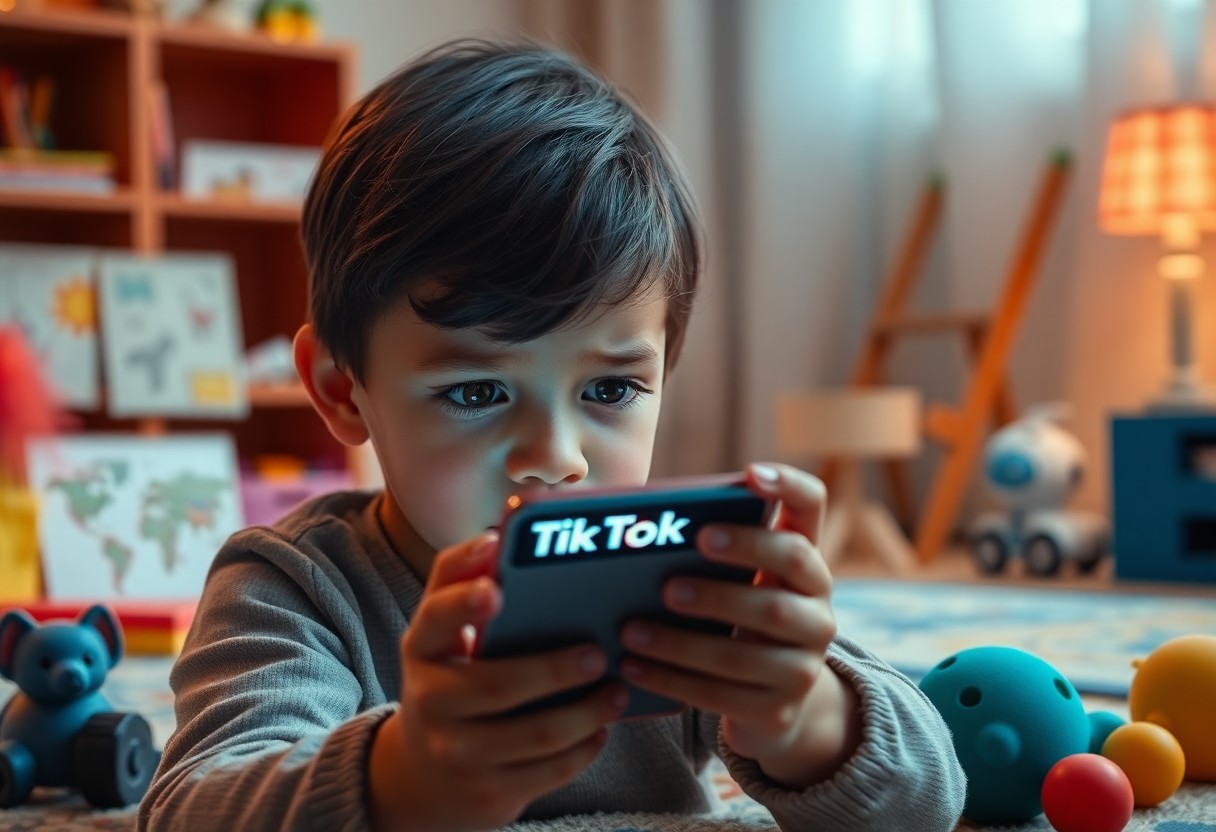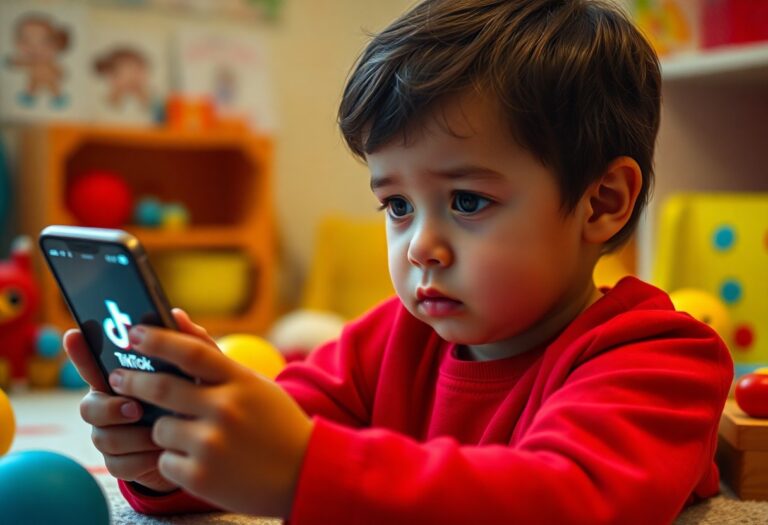Over the past few years, TikTok has emerged as a social media powerhouse, captivating millions, including children. As a parent or guardian, you may wonder how this platform can affect your child’s mental well-being. While TikTok offers creative expression and community building, it also crosses the line with exposure to harmful content, unrealistic standards, and heightened anxiety regarding popularity and body image. This blog post will research into the potential effects of TikTok on your child’s psychology, helping you navigate this complex digital landscape.
The Psychological Impact of Social Media on Children
A growing body of research highlights the significant influence social media platforms, like TikTok, have on children’s mental health. These platforms can trigger issues such as anxiety, depression, and body image concerns, as children are often exposed to curated versions of reality. The constant barrage of images and societal pressures can distort their self-esteem and emotional well-being, making it necessary for parents and guardians to monitor and guide their children’s social media experiences.
Understanding Child Development
The developmental stages of children are critical as they navigate their emotional and social growth. Understanding how children form their identities, develop relationships, and perceive the world around them is fundamental. Exposure to social media during these formative years can accelerate certain emotional responses and influence behavior, leading to potential risks for their overall development.
The Role of Social Media in Shaping Identity
To fully understand the impact of social media on children, it is vital to consider how these platforms shape their identities. Young people use social media to explore their interests, connect with peers, and express themselves. However, this can also result in unhealthy comparisons and a distorted sense of self-worth based on likes and comments. The pressure to conform to online trends may lead to feelings of inadequacy or insecurity, often intensifying during crucial developmental years.
In addition to these pressures, social media can also provide opportunities for positive identity formation. Children can discover communities that resonate with their interests and experiences, fostering a sense of belonging. However, the flip side is that you must be aware of how easily children can fall prey to negative influences or harmful behaviors, as they may seek validation through extreme measures. Therefore, it is necessary to guide them in navigating these platforms wisely, encouraging a balance between online engagement and real-life connections.
TikTok’s Unique Features and Their Effects
While TikTok’s distinctive features, such as short-form videos and personalized recommendations, have transformed the way content is consumed, they may also pose risks to children’s mental well-being. The app’s vibrant and fast-paced environment can create unrealistic standards and pressures, potentially leading to issues such as anxiety and low self-esteem among its young users.
Short-Form Content and Attention Span
At its core, TikTok’s short videos are designed to capture attention quickly, often resulting in decreased attention spans. Children who engage with this format might struggle to focus on longer, more complex tasks, which could impact their academic performance and overall cognitive development.
The Algorithm’s Influence on User Engagement
At the heart of TikTok’s success is an algorithm that customizes content based on your interactions, creating an addictive loop that keeps users engaged for extended periods. This reliance on a tailored feed can foster feelings of dependency, harmony with confirmation bias, and even exposure to harmful content.
Unique to TikTok is its sophisticated algorithm, which uses your viewing history and interactions to curate a personalized feed. This means that as you engage with specific content, you may find yourself more exposed to similar themes, further intensifying existing interests or concerns. While this can offer gratification and community, it can also lead you down a path of echo chambers and potentially harmful content, impacting your perspective and overall mental health. Children, in particular, may struggle to discern reality from the content presented, leading to skewed perceptions of societal norms and self-worth.
Exposure to Inappropriate Content
Some children using TikTok may inadvertently stumble upon inappropriate content that does not align with their age or maturity level. The platform’s algorithm can sometimes expose users to videos that are violent, sexual, or otherwise not suitable for younger audiences, potentially leading to confusion or negative psychological impacts. The ease of access to such material raises concerns for parents and guardians who want to protect their children from harmful influences.
Risks of Misinformation and Harmful Trends
Above all, TikTok has a high potential for spreading misinformation and endorsing harmful trends that can adversely affect young minds. You may see challenges that could encourage dangerous behaviors or lifestyles, making it vital to stay vigilant about what content your child engages with on the platform.
The Role of Parental Guidance and Oversight
Around the world, parents should implement guidance and oversight to help navigate the online landscape safely. It is your responsibility to actively engage with your child’s TikTok experience, discussing the importance of critical thinking and discerning fact from fiction. By maintaining an open dialogue, you can empower your child to make informed choices about the content they consume.
In addition to engaging discussions, establishing guidelines around screen time and monitoring your child’s TikTok activities can significantly enhance their online safety. Consider using parental control features to filter out inappropriate content, allowing safe exploration of the platform. Encourage your child to share their favorite videos and creators with you, fostering a supportive environment that values consent and awareness of potential dangers. By being proactive, you can help mitigate the risks associated with exposure to harmful content on social media.

Social Comparison and Self-Esteem Issues
To understand the effects of TikTok on children’s mental health, you must consider the platform’s inherent nature of social comparison. Youth view curated lifestyles, which can lead to unrealistic standards, affecting their self-esteem. This trend is noted in many discussions on TikTok and Youth Mental Health: Weighing the Pros and …. Exploring these dynamics can help measure TikTok’s real impact on self-worth and mental well-being.
Influencer Culture Impact
| Positive Aspects | Negative Aspects |
|---|---|
| Inspiration and motivation | Unrealistic expectations and pressure |
| Connection with relatable figures | Feelings of inadequacy and jealousy |
Impact of Influencer Culture
With the rise of influencer culture on TikTok, children are constantly exposed to idealized versions of reality that may distort their perception of self-worth. This can foster a false sense of achievement and lead to dissatisfaction with their own lives. You might find your children modeling behaviors or desires after influencers, which often only serve to enhance feelings of inadequacy.
Psychological Consequences of Comparison
About the psychological impact, the act of comparing oneself to others can lead to significant distress. Constant exposure to highly edited content may result in feelings of anxiety and diminished mental health. This social comparison phenomenon can warp children’s perceptions of reality, making it vital for you to navigate their TikTok experience carefully.
Further Insights on Psychological Consequences
| Possible Outcomes | Long-Term Effects |
|---|---|
| Increased anxiety and depression | Low self-esteem and identity issues |
| Isolation or withdrawal from peers | Difficulty in forming genuine connections |
Even minor comparisons can escalate to significant psychological consequences that may affect your child’s lifelong emotional health. These comparisons often create a vicious cycle of feeling inferior, leading to further social withdrawal and emotional distress. Watching others’ curated lives might spark discontent, illustrating the importance of fostering a healthy environment where children feel valued for who they are, rather than how they compare to others.
Potential Positive Effects of TikTok
Unlike many social media platforms that can prioritize negativity, TikTok offers unique opportunities for creativity and self-expression. Through its short video format and diverse trends, it empowers users, especially children, to showcase their talents, share their passions, and connect with others that share similar interests. This can lead to a boost in self-esteem and a sense of belonging, making it a valuable tool in enhancing youthful development.
Creativity and Self-Expression
Behind the playful dances and comedic skits, TikTok serves as a canvas for young creators to explore their imagination. By utilizing various editing features and music options, children can produce content that reflects their personality. This process not only nurtures their creativity but also allows them to communicate their thoughts and feelings in ways words sometimes cannot.
Building Community and Support Networks
Along with creativity, TikTok facilitates the formation of communities and support networks for users of all ages. It connects you with individuals who share your interests and challenges, fostering a sense of unity among them. Through engaging in niche groups or trends, you can find camaraderie and encouragement from peers, which can have a profoundly positive influence on your mental well-being.
In fact, these communities frequently offer emotional support and understanding, especially among children facing struggles such as bullying or mental health issues. The shared experiences explored on TikTok can help you realize that you are not alone in your challenges. Additionally, participating in supportive dialogues can lead to increased resilience and coping strategies, enabling you to better navigate the complexities of childhood and adolescence. The platform thus plays a significant role in enhancing your social well-being and forming lasting connections.
Strategies for Mitigating Risks
Once again, it is imperative to implement effective strategies to mitigate the potential risks TikTok poses on children’s mental well-being. Engaging with children about their social media usage and encouraging open communication can create a safer environment. Parents and caregivers should consider utilizing parental control apps and regularly monitoring content to ensure age-appropriate interaction, promoting a balance between online and offline activities.
Digital Literacy and Education
Among the most effective ways to empower your children is through digital literacy and education. Teaching them about the impact of social media on perception and self-image helps them navigate online platforms more thoughtfully. By fostering critical thinking skills, you enable your children to understand the difference between curated online personas and reality.
Setting Boundaries and Screen Time Management
Management of screen time is imperative in fostering a healthy relationship with technology. Establishing clear boundaries regarding usage helps prevent excessive exposure to TikTok, which may lead to negative psychological effects. Encourage regular breaks and family activities that engage your children in alternative forms of entertainment.
Screen time management can significantly impact your child’s mental health. Setting specific time limits for TikTok usage prevents them from becoming overly absorbed in the app. Moreover, it provides an opportunity for your child to engage in other activities that contribute to their overall well-being. By promoting a balanced lifestyle filled with physical exercise, academic pursuits, and social interactions, you’ll create a more resilient foundation, allowing them to enjoy the positives of social media while minimizing its dangers.
To wrap up
With this in mind, you should consider the potential impacts TikTok may have on children’s development and mental health. The platform’s emphasis on trends, validation through likes, and rapidly changing content can contribute to issues like self-esteem problems and anxiety. As a responsible adult, it’s crucial to guide and monitor how children engage with social media. Open conversations about their online experiences and promoting a balanced life offline can help mitigate any negative effects. Your active involvement can foster a healthier relationship with digital media for younger users.






0 Comments